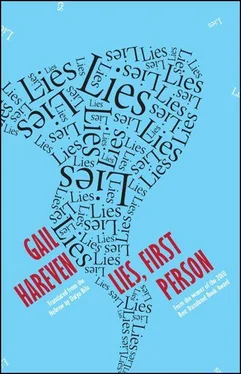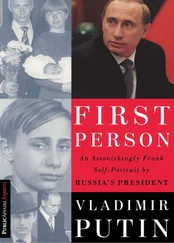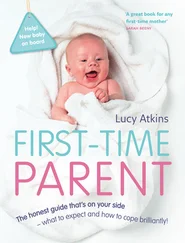Oded grabs hold of a garment and lifts the slumped body, and walking backward in a strange kind of slow motion, he drags it step by step to the fish pond and drops it on the edge.
“Can you drive?”
On its knees, the body stretches its hands to the water.
“Elinor, I’m asking you, can you go and get the car and bring it here?”
“Yes. What?”
My husband puts both hands on my shoulders and brings his face close to mine. “Ramat Hovav. The garbage dump,” he says with a crooked smile, “the garbage dump. Now go, bring the car. I’ll meet you outside in five minutes.” And then he almost pushes me to the door.
When I come out into the street, accompanied by my husband’s condolences, the heat closes in on me again, and my feeling of completion is shattered by a crushing realization. Ramat Hovav. With absolute clarity I realize that from now on there would be no retribution, nothing but miserable condolences such as these. Because I would never succeed in getting the First Person to confront the Defender.
I had one chance to lay my trap and I failed to take advantage of it: I wasted it childishly, and my punishment from now on would be the consoling words intended to mollify a foolish child.
At the top of the road, at the entrance to Emek Refaim Street, they were repairing the street for the umpteenth time. A bulldozer trundled, the air was steamy and reeking of tar. Behind my back, beyond the Valley of Hinnom, the Old City was illuminated by a lighting display, and the ancients mocked me from inside the walls. No fire burned. No famine arose. No heads were smashed on a stone. I was given a single opportunity, and I sprayed fixative.
My husband would clean up after me, the way you clean up the mess made by a wild, wayward child. He would take him to the Emergency Room, and say “an accident,” and “hormonal imbalance” and “vodka.” He would talk and explain until Not-man forgave me. “My wife this and my wife that,” he would say. My lawyer would undertake to see that I went to therapy on condition that no charges were brought. And Not-man would go on walking the land, and Not-man would forgive me, and no charges would be brought.
I climb the two hundred meters to the Scottish church. With great difficulty I climb. The metastasis of the abomination had not been excised, and it would only go on growing inside me. And as I climb I think: I’d be better off dead, and I know that Oded remains behind me, and that I won’t die and leave him there, behind me. Five minutes, he said.
Five minutes later my husband opens the back door of the car. “I’m sorry,” he says over the recalcitrant bundle. “I’m really sorry, but I have no option but to take you to the hospital. Both as a human being and as a lawyer I must insist.” And then he guides or pushes the bundle onto the seat behind me. From the way he talks it’s clear that he had started this prattle earlier, and perhaps he had been keeping it up throughout my absence.
Until Oded gets him into the car I register an image: First Person’s eyes have narrowed to motionless slits. The bouffant crest of hair around the huge mask of his face looks as if it has been set with hair spray. The front of his jacket is wet.
Oded slams the door, and through the open window for the second time this evening he brings his face close to mine, and for the second time he asks me: “Can you drive?” I nod, and again he says: “The garbage dump,” and only then, so quietly I can hardly hear: “Ramat Hovav is quite far. Take the road to Mishor Adumim. You know the way. I’ll direct you from there.”
For a moment I am alone in space with First Person and his wheezing breath, and then Oded circles the car and gets into the back seat next to him. His movements are exaggerated, as if directed at the eyes of distant spectators; every movement is a gesture, and in a magnified gesture of a routine action he fastens the safety-belt around him. “Here, allow me. .” another click. And the seatbelt on the other side is locked as well.
I step on the gas. I sit high up in the Defender. Behind me Not-man is half blind, motionless, making queasy sounds of nausea, and Oded who doesn’t stop talking to him confirms in an exaggeratedly loud and emphatic voice that I understood the unbelievable correctly. “Hadassah Mount Scopus, the ER,” he says. “Just to be on the safe side, so we can all have peace of mind. We’ll go in and get it over. An unfortunate accident. In any case it’s better for all of us to have documentation. According to what’s written on the can washing with water should be enough, but nevertheless. .”
A wind blows in and snatches away some of his words. The car is blazing hot. And I can’t bring myself to close the windows and turn on the air-conditioner.
After the Jaffa Gate the road enters a tunnel and comes out on the south side of the Old City wall with a split-second view of the Dome of the Rock in all its glory. Only ten minutes walk from here, in a parallel universe, is our house. And we drive ahead, into the distance. Oded babbles on about “the pace of the infrastructure construction, even the people who live here get lost. The city must look very different to you from your last visit.” And the road takes us on, to the south.
The First Person, as I said, is half blind. The fixative presumably makes it difficult for his eyes to move. Even Jerusalemites lose their way on the roads. But a few minutes after the car drives past the Hyatt Hotel and the turn off to Mount Scopus on the left, as we approach the traffic lights, the mouth behind me whispers: “I want to go to the hotel. To the hotel. Please be good enough to take me there.”
Another spate of talk from Oded. Whenever we stop at a traffic light he increases the volume. And I no longer listen to the words, only to the artificial tone that once again confirms that I was not mistaken, that it’s true: we drive on.
“Pay attention. In a little while at the intersection. Turn right.”
We pass a police roadblock. We don’t stop. And when the car starts to descend the Ma’aleh Adumim road I marvel at the breadth of the road, which I haven’t traveled on for a long time, at the number of the vehicles, and at the fact that my ears remain open on the descent. On almost every journey to Tel Aviv my ears are blocked by the difference in the pressure, and now, on this steep descent, they remain open. It occurs to me that this may be the effect of the vodka, since alcohol dries, and it’s lucky that I drank vodka.
“Hail me a cab,” the not-voice requests.
The lights of the town dwindle, and soon they are behind us. The streetlamps draw a bridge in the desert. A blazing wind closes my pores, and my skin has resumed its function and again separates me from what is outside me.
A dark night. The bridge of light slides between the curves and hollows of the clean desert darkness. My two hands on the unaccustomed steering wheel. My foot on the gas pedal. A Muslim moon, a slender sliver of a moon, appears in the east beyond a hill.
Not-man says “Hail a cab for me,” and again, “a cab.” His breath wheezes and creaks. His mouth breathes heavily, and then he says something long that I don’t catch.
“What did he say?”
“He says that he can cancel his contract for the book. That he only wanted to hear our opinion.”
“Tell me,” I almost shout at Oded, “do you also think that suffering is more real than happiness? That happiness is only a momentary relief from suffering? No more than that?”
“After Mitzpe Jericho take a right. There should be a sign for Nebi Musa.”
“As if you put something heavy on someone, say a suitcase, and then lift it,” I say.
Читать дальше












